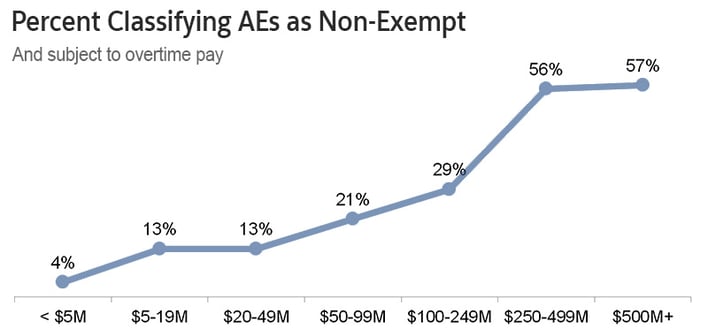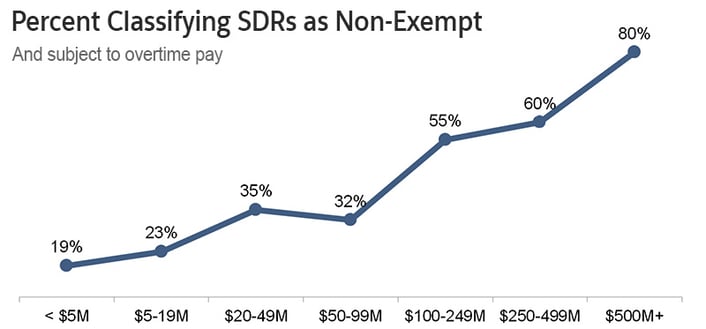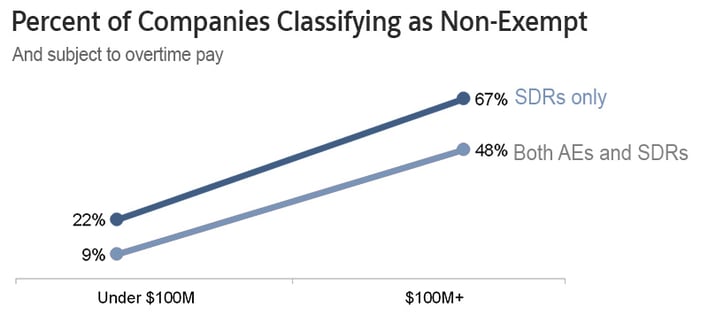Three weeks ago, the Department of Labor published its final rule updating the overtime regulations under the Fair Labor Standards Act (FLSA). Whether to classify inside sales reps as exempt or non-exempt remains a very messy issue. For those unfamiliar, non-exempt employees are:
Subject to overtime pay
Entitled to rest and meal breaks
Required to keep time records
By a stroke of luck brilliant strategic planning, I happened to be running research on how companies classify their SDRs and AEs for the purposes of overtime pay.
One hundred fifty-nine companies were kind enough to participate. Let’s first turn to what the new rule means.
What’s in the final rule
What has changed: The salary and compensation levels needed for the Executive, Administrative and Professional exemption will be raised to $47,476 on December 1st, 2016. The total annual compensation requirement for highly compensated employees (HCE) will be raised to $134,004.
What hasn’t: The duties tests for Executive, Administrative, Professional, Computer & Outside Sales Employees haven’t changed. Whether your SDRs or AEs meet any of those exemptions is for your General/Outside Counsel to decide.
Finding 1: Few companies are classifying AEs as non-exempt
The majority of inside Account Executives are classified as exempt from overtime pay. As companies approach $250M in revenues, the percent doing the reverse (non-exempt + paying overtime) rises sharply.

Finding 2: Many more companies classify SDRs as non-exempt
Sales Development Reps are more than twice as likely to be classified as non-exempt (overtime eligible). At $100M+ in company revenues, there is a significant jump.

One interesting point to note is that many companies classify their SDRs as non-exempt and their AEs as exempt: roughly 23% of respondents. No companies reported classifying their AEs alone as non-exempt.
Finding 3: ~$100M in revenues is an inflection point
The percent of companies classifying SDRs alone as non-exempt triples above $100M—from 22% to 67%. The number of companies classifying both AEs and SDRs as non-exempt nearly quintuples—from 10% to 48%.

Net net
I’m not here to offer legal advice. But our industry is clearly of two minds on this issue. So why is this the case?
- Many (smaller) companies have never heard about the FLSA overtime requirements
- Others don’t see a distinction between what Field Sales and Inside Sales are doing
- Some have been advised by counsel to classify as exempt
- And, undoubtedly, many more are hoping to fly under the radar
I also collected comments from Leaders on this topic and I want to share a few with you:
"Non-exempt employees are less productive because, most of the time, the company won't allow overtime. Reps don't like the concept of feeling like a factory worker who has to clock in and clock out. As a manager, it’s time consuming and an annoyance to have to explain it every time a new employee starts or when they have to enter hours after a business trip."
"I originally started SDR's as exempt but had to move them to a non-exempt status - which was painful. The earlier you're able to start them as non-exempt, the better."
"Slippery slope for SDRs and inside AEs to be classified as exempt; they can argue that their work extends beyond office hours (prospecting at home/administrative work at home, for example) and they should be compensated for their extra work. A case can be made that Field AEs who work from home should not be exempt either, though I'd argue that the sheer nature of how a typical Field AE manages their day should not entitle them to overtime."
"AEs (and the entire Sales team) are a critical part of our company and should be full time employees just like anyone else. People join a startup to be empowered, go the extra mile, have a stake in the ultimate success. They take a sales role to control their own earnings. The concept of working hourly, or overtime, is ridiculous in the overall context mentioned above."
I’d love to hear what you’re seeing and, if your reps are non-exempt, how you manage their expectations.Thanks for sharing.
Further reading
- Zillow Wage and Hours Class Action Lawsuit
- The Extremely Narrow Overtime Exemption For Inside Salespersons
- What Inside Sales Leaders Need to Know About Exempt vs. Non-Exempt - Dave Chwalik
